Probate Lawyer Fees Guide: What to Expect in 2025
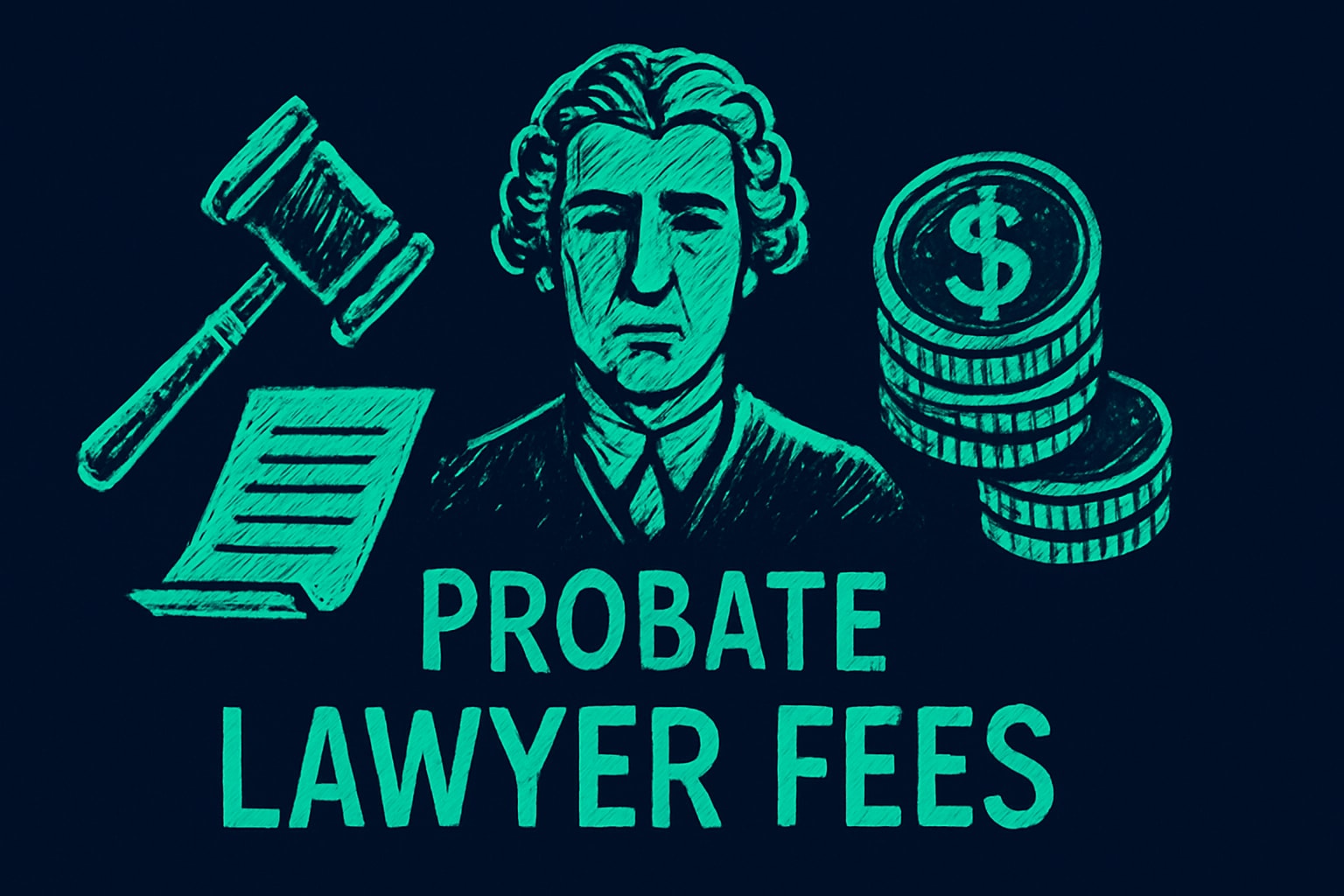
Thinking about probate lawyer fees in 2025? Let’s be honest, nobody enjoys finding out legal bills cost more than your first car. If you’re hoping to avoid a nasty surprise, you’re in the right place.
This guide strips away the legal jargon and exposes what you’ll really pay for probate lawyer fees next year. Want to know how costs are calculated, what drives them up, and how to keep your family’s assets from disappearing faster than socks in the dryer? We’ll cover it all.
Ready to dodge the landmines and actually plan like an adult? Let’s get started.
What Is Probate and Why Does It Matter?
So, what is probate? Think of it as the DMV for your soul’s leftovers. Probate is the court-supervised process that sorts out your estate when you finally take the eternal dirt nap. Whether you have a will or not, someone’s got to make sure your stuff lands in the right hands and your debts don’t follow you to the afterlife (or haunt your family).
The executor (named in your will), administrator (if you didn’t bother with a will), or personal representative (fancy catch-all term) is the lucky soul who deals with the paperwork. Their job? Herding cats, wrangling paperwork, and making sure the state doesn’t gobble up your PlayStation. Yes, probate lawyer fees are waiting in the wings, ready to take a slice if things get messy.
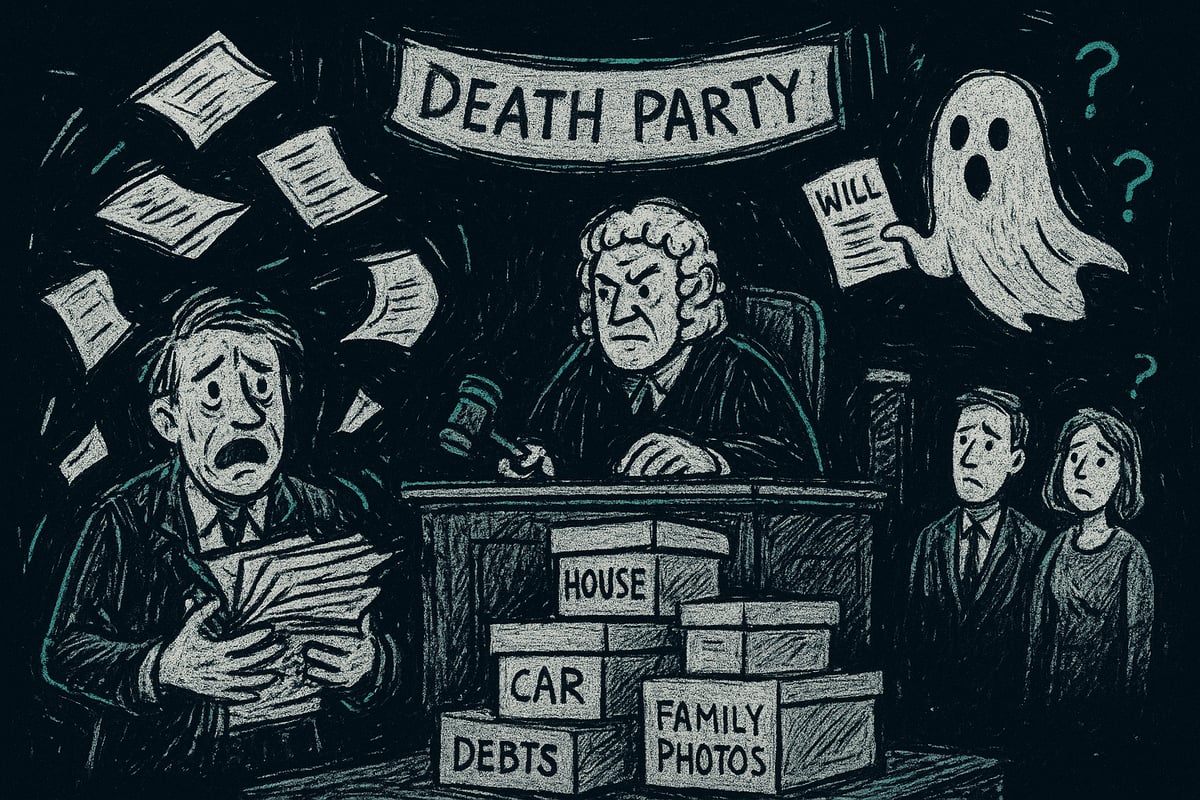
Let’s break down the probate process, so you don’t get ambushed:
-
File a petition with the court (aka, “let’s get this death party started”).
-
Notify all heirs and interested parties, even your cousin who still owes you $50.
-
Inventory the assets, from real estate to that ugly vase everyone hates.
-
Pay off debts and taxes, because Uncle Sam always gets paid.
-
Distribute what’s left to the rightful heirs.
-
Close the estate. Finally.
Why bother with probate? For starters, it legally transfers assets and settles debts. If you skip it, nothing’s officially yours (or anyone else’s). And no, probate isn’t just for the one percent. Most states require probate for estates above a laughably low threshold. According to recent data, the average probate takes several months to a year, depending on how organized (or not) your records are. Estate Lawyer Fees Overview provides a great look at the range of probate lawyer fees and factors influencing them, so you can stop pretending this doesn’t apply to you.
Let’s compare two estates to see how probate lawyer fees, time, and stress stack up:
| Estate Type | Complexity | Time | Probate Lawyer Fees Impact |
|---|---|---|---|
| Simple (Will, organized records, no disputes) | Low | 3-6 months | Lower (minimal headaches) |
| Complex (No will, missing docs, family feud) | High | 12+ months | Higher (lawyer bills galore) |
Bottom line: even if you only own a rusty Honda and a Netflix password, probate matters. Skip the procrastination. The more tangled your estate, the more you’ll fork over in probate lawyer fees, and the longer your heirs will have to wait. Start planning your death party now, or the court will throw one for you—and trust me, their playlist sucks.
How Probate Lawyer Fees Are Structured in 2025
Welcome to the magical world of probate lawyer fees in 2025, where your wallet gets lighter and your patience gets tested. Grab your calculator and a stiff drink, because this is where the real fun begins.
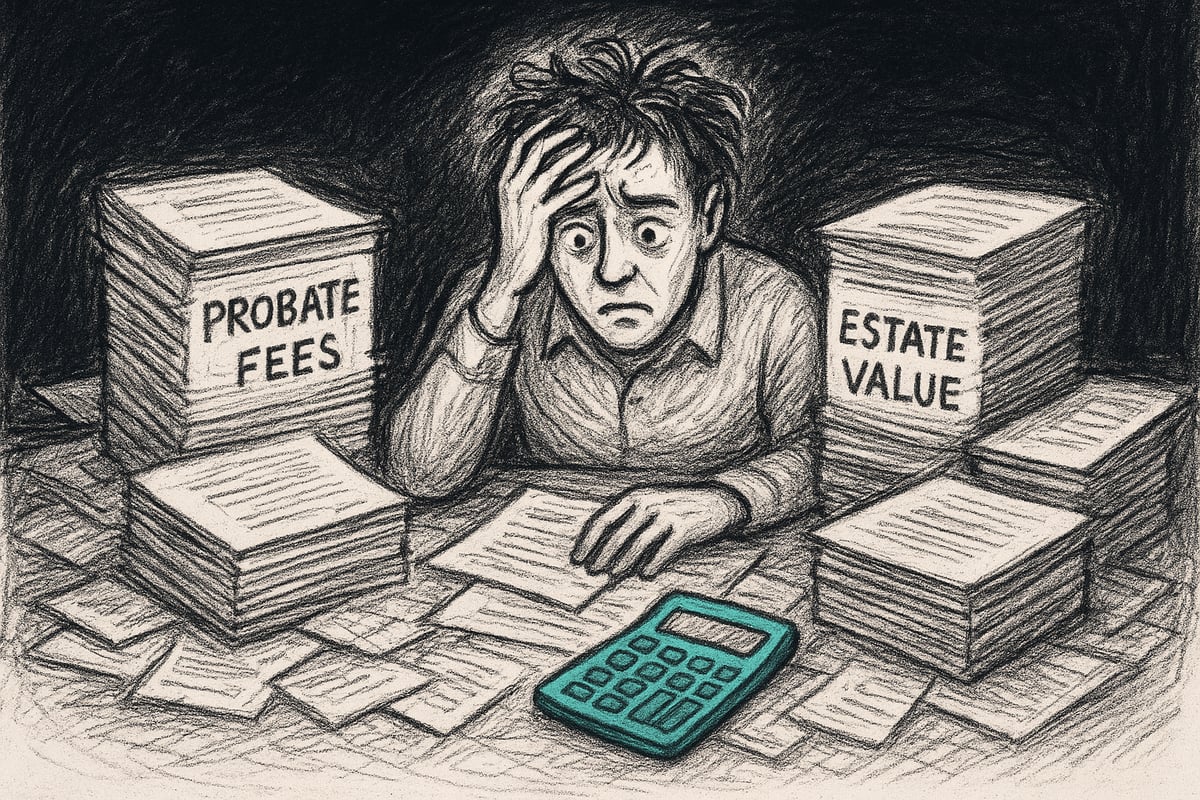
Fee Structures: Hourly, Flat, and the Dreaded Percentage
Probate lawyer fees come in three main flavors: hourly rates, flat fees, and percentage of the estate. Hourly rates are like playing roulette with your bank account, with national averages in 2025 hitting $250 to $600 per hour, depending on whether your lawyer drinks artisanal coffee or just regular old drip. Flat fees are sometimes offered for straightforward cases, and can range from $3,000 to $7,500 for basic estates. Then there’s the percentage model, where lawyers take a statutory cut—often 3% to 7% of the estate’s gross value, not net. In places like California, the law spells out exactly what your lawyer can skim off the top. If you want a deep dive into how this works, check out Probate Legal Fees in California for a reality check.
What’s Actually Covered (And What’s Not)
Here’s the fun part: probate lawyer fees don’t cover everything. What you do get is legal advice, document prep, court representation, and keeping the heirs from metaphorically strangling each other. What you don’t get? Court filing fees (those are extra), property appraisals, accountant bills, and the pleasure of paying for legal notices in the local paper. Think of it as ordering a burger and learning fries cost extra. Always read the fine print and ask for a detailed fee agreement—unless you enjoy expensive surprises.
Let’s Get Real: $500,000 Estate Fee Breakdown
Below is your “just how much will this cost me” cheat sheet, based on a $500,000 estate. Spoiler: It’s not pocket change.
| Fee Structure | Typical Cost (2025) | What You Get |
|---|---|---|
| Hourly Rate | $12,500–$30,000 | Billed for every call, doc, and coffee break |
| Flat Fee | $5,000–$10,000 | Standard probate tasks, no drama |
| Percentage of Estate | $15,000–$35,000 | Statutory % of gross value, CA-style |
So, whether you’re paying by the hour, per task, or by the pound (okay, percentage), probate lawyer fees can gobble up a chunk of your inheritance. Plan ahead, read contracts, and don’t let your ex get your PlayStation by accident.
Factors That Influence Probate Lawyer Fees
Let’s be honest, probate lawyer fees are like the price of avocados: nobody really knows why they skyrocket, but they do, and you’re forced to pay up. The good news? You can actually predict what drives those costs, if you don’t fall asleep first.
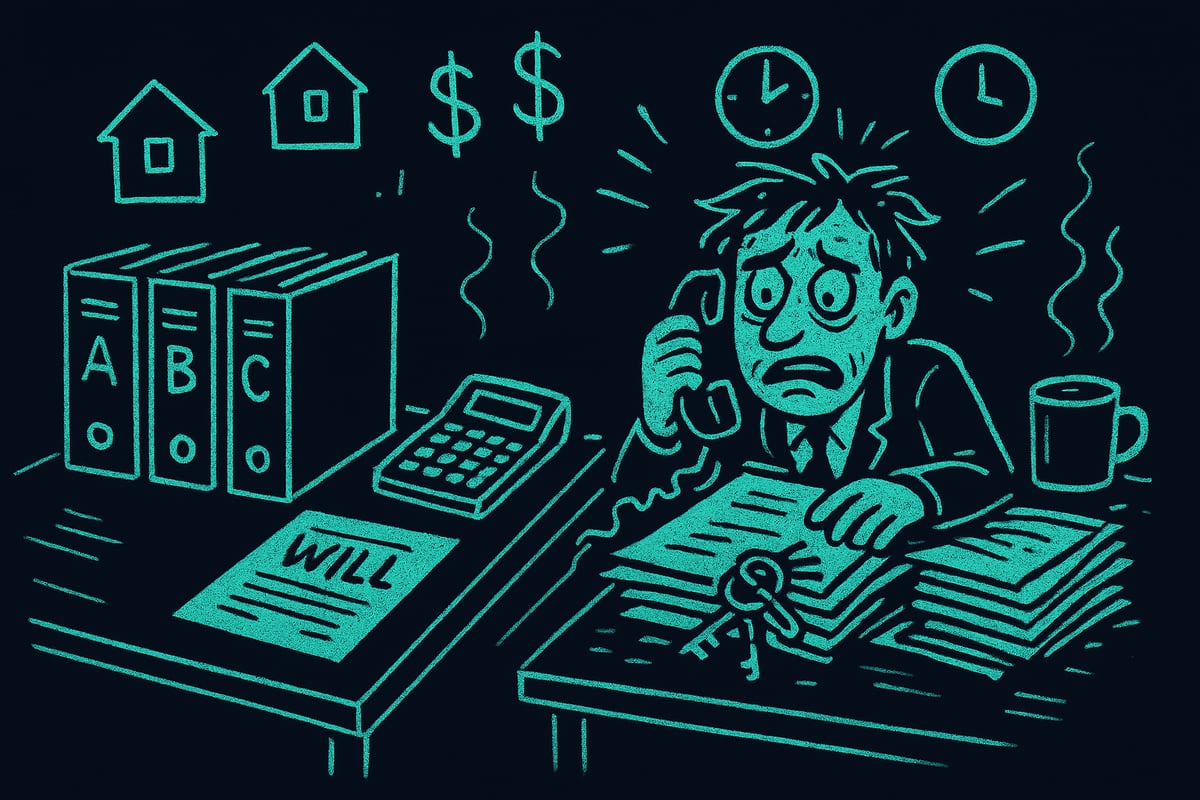
Estate size and complexity are the biggest monsters under your bed. The more stuff you own, the more work it takes to sort out your legacy. A sprawling estate with vacation homes, crypto wallets, and a collection of rare Beanie Babies? Congratulations, your probate lawyer fees just went up.
But wait, there’s more. Family drama and legal disputes are like pouring gasoline on the fire. If your heirs love a good fight, expect those fees to balloon. Will contests, creditor claims, and sibling showdowns all mean more hours billed.
Let’s talk paperwork. If you leave behind a clean, organized trail—think labeled folders, updated account lists, and a will that actually makes sense—your probate lawyer fees will thank you. If your “system” is a shoebox full of receipts and cryptic notes, buckle up.
Where your assets live also matters. Real estate in multiple states or business interests across borders can send your lawyer scrambling for local rules, hiking up costs. Curious about how state law changes the game? Check out this deep dive on Probate Lawyer Fees in Texas for some eye-opening examples.
Now, let’s roast the executor. If you pick Cousin Eddie who’s never read a bank statement, your probate lawyer fees will climb as the attorney holds his hand through every step. Add in tax headaches—if your estate is big enough to face federal or state taxes, you’ll pay for that expertise.
Finally, local court quirks can throw a wrench into things. Some courts want everything triple-stamped, others barely glance at paperwork. For example, two $500,000 estates might look identical on paper, but if one has organized records and a savvy executor, the probate lawyer fees could be thousands less than the disorganized, drama-filled alternative.
Who Pays Probate Lawyer Fees and When?
You know what’s more awkward than a family fight over Grandma’s vintage ashtray? Not knowing who’s stuck with the bill for those mysterious probate lawyer fees. Spoiler: it’s usually not you, at least not directly. In most cases, probate lawyer fees are paid straight out of the estate’s assets, not from the executor’s or heirs’ pockets.
Here’s the catch: while you’re mourning or pretending to, the estate is quietly footing the legal bill. Executors often get asked, “Do I have to pay these fees myself?” Nope. Unless you decide to hire your own lawyer for personal advice, the estate itself pays for the lawyer guiding the probate process.
But when do the lawyers actually get their money? Some demand an upfront retainer—a fancy word for a security deposit. Others are more patient, waiting to collect their share once the estate’s assets are finally distributed. The payment structure often depends on local rules, the complexity of the estate, and the lawyer’s own policies. For example, in Florida, the process and timing can be a bit different, as explained in this excellent breakdown of Probate Lawyer Costs in Florida.
Let’s talk approval. In several states, the court must give a thumbs-up before probate lawyer fees are paid. In others, the executor wields the power. Either way, the fees have to be “reasonable”—a term lawyers love because it’s as vague as your uncle’s memory at Thanksgiving. If you think the bill is outrageous, heirs and beneficiaries can object, but get ready for paperwork and a possible court showdown.
Remember, every dollar spent on probate lawyer fees is a dollar less for the people inheriting your stuff. Here’s a quick timeline to help you visualize how these payments usually roll out:
| Stage | Who Pays | When Paid |
|---|---|---|
| Estate opens | Estate (via retainer or assets) | Start of probate |
| Court or executor approves fee | Estate | During probate |
| Final distribution | Estate (remaining assets) | End of probate |
On average, expect it to take several months for probate lawyer fees to be approved and paid in 2025. The process might stretch longer if there’s a dispute—or if your family is especially dramatic.
So, if you want to keep your loved ones from plotting your second funeral, get clear about how probate lawyer fees are paid and when. A little planning now can save everyone headaches (and maybe a few awkward holidays) later.
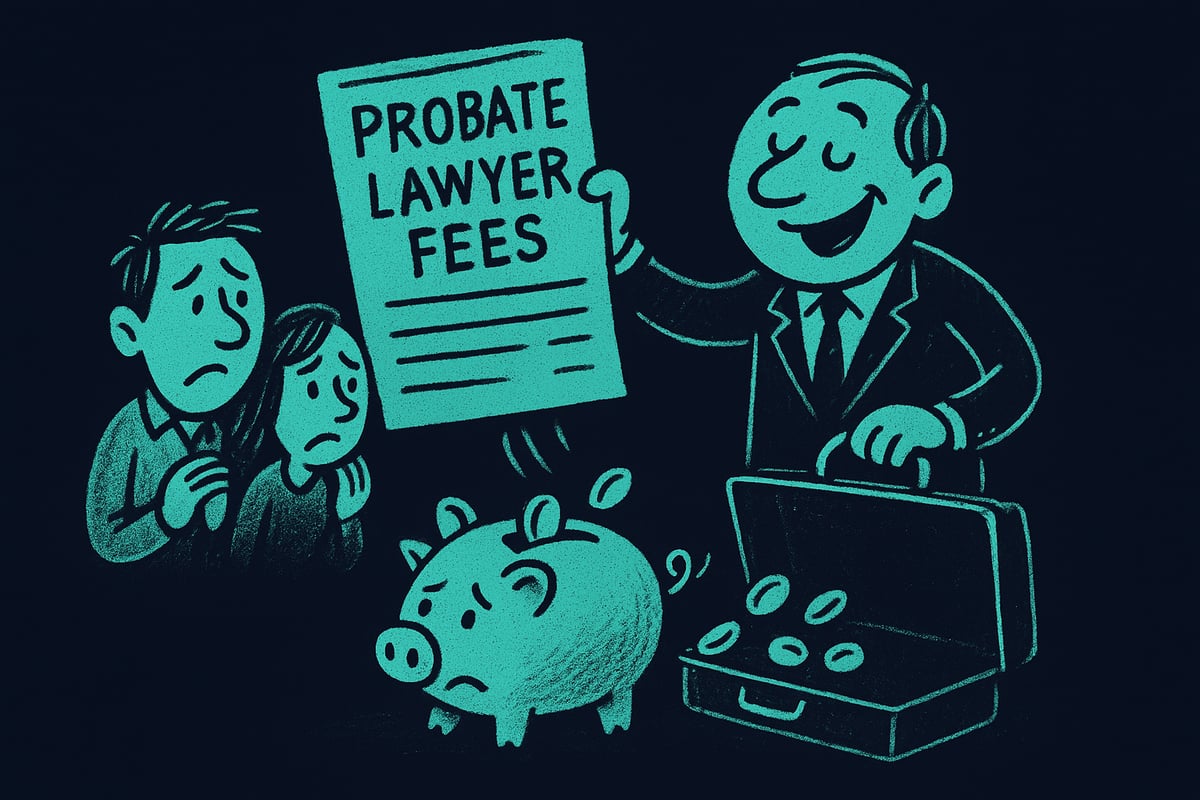
How to Reduce Probate Lawyer Fees (and When to Avoid Probate Altogether)
Let’s face it: nobody daydreams about paying probate lawyer fees. If you’re allergic to wasting money (or just want to keep your heirs from brawling at your funeral), you need a plan. Here’s how to keep more cash in the family and less in the hands of lawyers who buy artisanal coffee with your estate.
Get Your House (and Paperwork) in Order
First step: don’t wait until the grim reaper is at your door. Organize your assets, debts, and important documents while you still have a pulse. A tidy estate means less work for your lawyer, which means lower probate lawyer fees. Label your accounts, make a list of what you own, and keep it somewhere your executor can actually find it (no, not under the mattress).
-
Keep copies of deeds, titles, and account statements together.
-
List digital assets and passwords (unless you want your Bitcoin to vanish).
-
Make sure your will is up to date and not written on a cocktail napkin.
Executor: Choose Wisely
You wouldn’t hand your car keys to a toddler, so don’t pick a clueless executor. An experienced or organized executor can save hours (and dollars) by handling tasks efficiently, which directly lowers probate lawyer fees. If your executor needs hand-holding, guess who pays for the lawyer’s extra time? That’s right, your estate.
-
Choose someone who can read instructions and isn’t allergic to paperwork.
-
Brief them on where to find your documents.
-
If you’re feeling generous, leave them a cheat sheet.
Non-Probate Transfers: The Fast Lane
Want to avoid probate lawyer fees altogether? Use non-probate transfers like joint accounts, payable-on-death designations, or a living trust. These tricks let your assets skip the probate line entirely, like a VIP pass at a club for the almost-dead.
Here’s a quick cost comparison:
| Estate Type | Average Legal Fees | Time to Close |
|---|---|---|
| Traditional Probate | $15,000 (on $500k estate) | 9-12 months |
| Non-Probate Transfers/Living Trust | $2,000 - $4,000 | 1-3 months |
If you keep your estate simple and communicate your wishes, you can dodge probate lawyer fees and spare your family a courtroom soap opera. Ditch the drama, plan ahead, and keep your wealth where it belongs.
Look, you’ve made it this far through a guide about probate lawyer fees in 2025, so let’s just call it what it is—you’re thinking about your own inevitable dirt nap. Good for you. Planning ahead now means your family won’t have to pay a small fortune or battle it out Thunderdome-style over your collection of vintage mugs. Skip the legal circus and the sky-high fees. You can set up a legally valid will in under 30 minutes, for a one-time fee that’s cheaper than your last bar tab. Seriously, don’t wait—Start My Will Now
Related Articles You Should Read
What Happens If You Die Without a Will in Tennessee: 2026 Complete Guide
What Happens If You Die Without a Will in Tennessee: 2026 Complete Guide Meta Description: Dying without a will in Te...
What Happens If You Die Without a Will in Pennsylvania: 2026 Guide
What Happens If You Die Without a Will in Pennsylvania: 2026 Guide Meta Description: Die without a will in Pennsylvan...
What Happens If You Die Without a Will in New York: 2026 Complete Guide
What Happens If You Die Without a Will in New York: 2026 Complete Guide Meta Description: Die without a will in New Y...